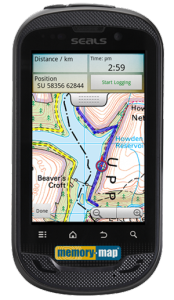Half smartphone, half GPS, the Memory-Map Android GPS TX3 does a little bit of everything with a rugged rating that will make the most adventurous spirits jealous. Unfortunately, it’s only available for the UK region, but the idea is kind of awesome, so I thought I’d include it in case we have any readers ‘across the pond’ so to speak. Seems about time someone thought to add an actual GPS chip inside a smartphone…
Anyway, this phone/GPS device is designed to function as a fully-featured android smartphone when you add any monthly SIM card from any network. (Alternatively, the device has Wifi and Bluetooth capabilities, so provided you could get signal you could also choose to use net calling via Skype or something of that sort while in town.) You can plan routes on your computer with the Memory-Map software that will be included with the purchase, or use the TrailZilla website to plan and share routes online, then email them to your Android GPS TX3. The device has a GPS chip for accurate trail route tracking, and is waterproof (rated to IP68 and Military 810G standards).
You can use the device as a lower cost alternative to an outdoor rugged phone and GPS partner or even to replace your dedicated GPS unit in a pinch. Designed as a multi-purpose device, the phone/GPS is pre-loaded with the Memory-Map Android App and available with a choice of Ordnance Survey mapping pre-loaded on SD card or as a ‘base unti’ with a blank SD cards to use with any other Memory-Map products.
Available maps seem to mostly be in Great Britain, Wales, Ireland and the surrounding areas. The device is available for preorder and will cost £229.



“Seems about time someone thought to add an actual GPS chip inside a smartphone…” They have been inside smartphones for years. The limiting factors have been ruggedness, waterproofing, battery life, and general usability.
Memory Map hasn’t just ruggedized their device, they seem to have made some compromises which pushes it towards the specialized gps. Specs are a bit thin on the ground but for instance the 3.5″ screen is closer to a Garmin Oregon 600 than it is to a smartphone (even a budget Moto G with 4.5″). I’d be interested to know the resolution. The weight is only 3 grams shy of the Garmin – I supsect that is in part due to a battery that brings life closer to a dedicated unit.
So although inside it is an android smartphone running their gps app (or any other android gps/mapping app I presume) I think it will still fall on the dedicated gps side of the fence and not necessarily something you would want as your everyday phone.
I’m sounding quite negative but I actually like the idea! I’m looking forward to more specs and reviews.
Garmin’s android (phoneless) Monterra seems to have been quite successful but I don’t think was quite the right way to go. This seems a lot more appealing, but as you point out, with limitations outside UK.
However, I do see that Memory Map has expended their mapping offerings to a handful of European contries so that is promising.
Well, you are correct about phones having chips, but the GPS found in most phones isn’t 100% based on satellites–it’s actually Assisted-GPS and requires a cell signal to locate you. What I meant was that this device has a true GPS and requires no cell signal. I should have written that better–sorry!
“the GPS found in most phones isn’t 100% based on satellites” is a contradiction of terms.
There seems to be this myth that A-GPS is fake some sort of fake GPS.
A-GPS refers to the ability to assist GPS to achieve a faster “time to first fix” (TTFF).
It is also commonly used to refer to solutions where the position may not be 100% GPS derived – it may be assisted by cellular data or wifi where GPS satellite coverage or signal quality is less than optimal.
Whether or not a phone locks down the ability to used GPS standalone is another matter. in my my last 3 android devices I have quite happily used an offline satnav app to use “device only” (i.e. GPS without cell or wifi) positioning.
Dedicated GPS handhelds are optimised for standalone GPS in many ways that smart phones are not. See http://gpstracklog.com/2013/11/smartphone-gps-tracks-endanger-life.html for an example.
The Memory Map device is sorely lacking detailed specifications to know what is really inside but to say it “has a true GPS” doesn’t really say anything.